As a hiring manager, you understand the immense impact a skilled Marketing Analyst can have on the growth and efficiency of a company's marketing efforts. Marketing Analysts provide actionable insights from data, enabling informed decision-making and strategic planning. However, many recruiters often struggle to identify the true potential of candidates as this role requires a blend of analytical skills, industry knowledge, and creativity.
In this article, we will guide you through the process of hiring a Marketing Analyst, from drafting the perfect job description to conducting effective interviews. Learn how to screen resumes, utilize skills tests, and evaluate candidates to find the best fit for your team. For more insights into the skills needed for this role, check out our Marketing Analyst Interview Questions.
Table of contents
Why Hire a Marketing Analyst?
A Marketing Analyst can help solve key business challenges. For example, they might analyze customer data to improve targeting strategies, resulting in higher conversion rates and ROI for your marketing campaigns.
Consider hiring a Marketing Analyst when you need to:
- Interpret complex market trends and consumer behavior
- Optimize marketing spend across channels
- Measure and report on campaign performance
If you're unsure about committing to a full-time hire, start with a short-term project or consultant. This allows you to assess the value a Marketing Analyst can bring before making a long-term investment. As your data needs grow, you can then transition to building an in-house team.
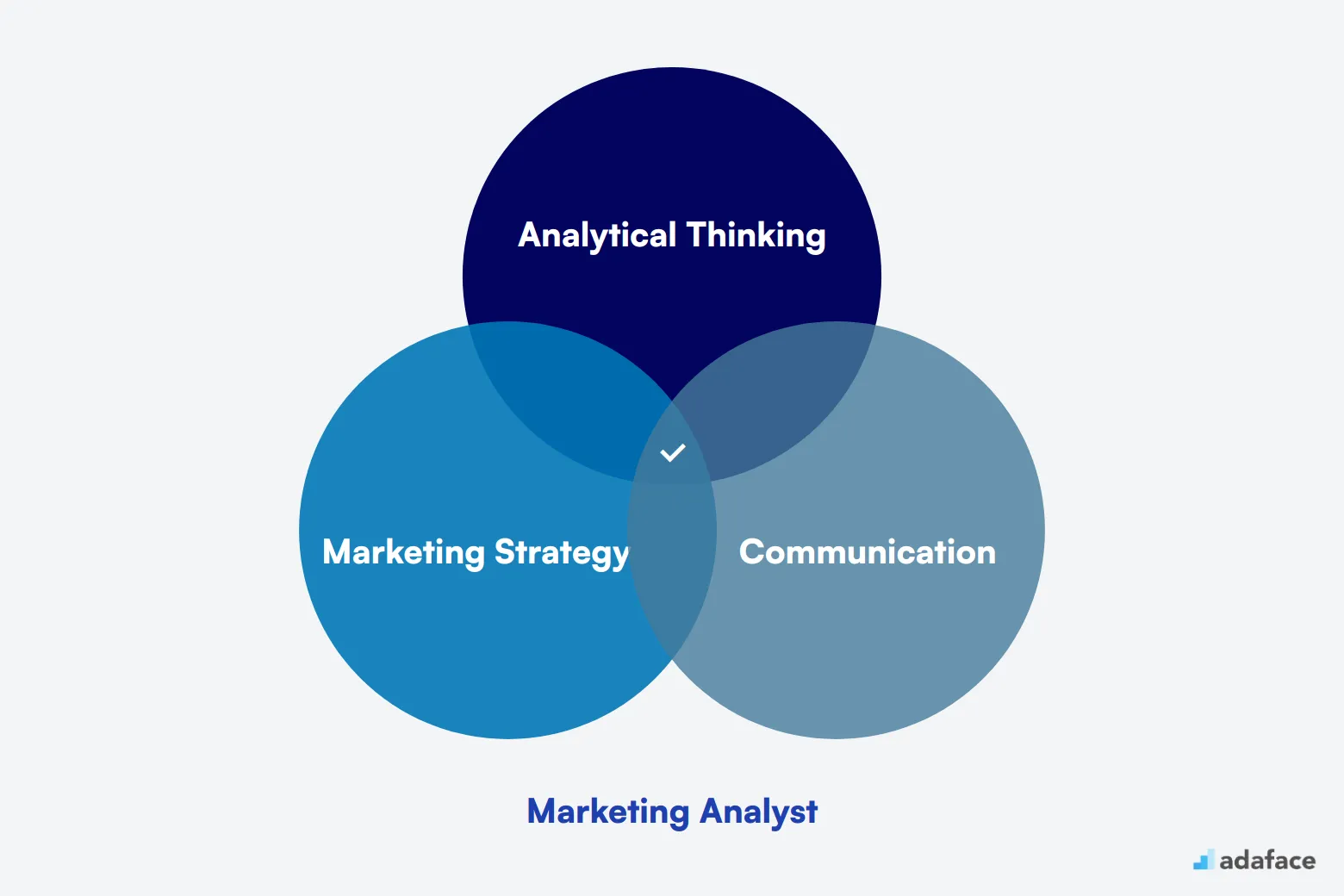
What Does a Marketing Analyst Do?
A Marketing Analyst plays a key role in helping businesses make data-driven decisions about their marketing strategies. They collect, analyze, and interpret data related to market trends, consumer behavior, and campaign performance to provide insights that guide marketing efforts and improve ROI.
The day-to-day responsibilities of a Marketing Analyst typically include:
- Gathering and analyzing data from various sources (e.g., sales reports, market research, and customer surveys)
- Creating reports and presentations to communicate findings to stakeholders
- Monitoring key performance indicators (KPIs) for marketing campaigns
- Identifying trends and patterns in consumer behavior
- Collaborating with other teams to develop and refine marketing strategies
- Conducting competitive analysis to understand market positioning
- Using statistical tools and software to process and visualize data
Key Skills and Qualifications for a Marketing Analyst
Hiring a Marketing Analyst requires a clear understanding of the essential skills and qualifications that can vary significantly between companies. What one organization deems necessary might be a mere bonus for another, leading to potential mismatches in expectations.
To streamline your hiring process, it’s important to distinguish between required and preferred qualifications. Below, we've outlined typical skills that are a must-have versus those that can enhance a candidate's profile.
| Required skills and qualifications | Preferred skills and qualifications |
|---|---|
| Bachelor's degree in Marketing, Business, or a related field | Experience with A/B testing and multivariate experiments |
| Two or more years of experience as a marketing analyst or in a similar role | Familiarity with SEO/SEM and content marketing strategies |
| Proficiency in using analytical tools like Google Analytics, Tableau, and Excel | Knowledge of SQL and database management |
| Strong understanding of marketing KPIs and metrics | Experience with CRM software like HubSpot or Salesforce |
| Excellent communication and presentation skills | Ability to work in a fast-paced, team-oriented environment |
How to write a Marketing Analyst job description?
Once you've defined the ideal candidate profile for a Marketing Analyst, the next step is to capture that information in a job description that attracts the right talent. A well-crafted job description is your first opportunity to communicate the role's value and your company's vision.
• Highlight key responsibilities and impact: Clearly articulate the day-to-day tasks and how they contribute to broader marketing strategies. Candidates are drawn to roles where they can see the direct impact of their work on the company's success.
• Balance technical skills with soft skills: While it’s important to list specific qualifications such as proficiency in data analysis tools and marketing automation platforms, also emphasize the need for strong communication and analytical thinking. This balance ensures you attract well-rounded candidates who can collaborate effectively.
• Showcase unique company and role aspects: Include what sets your company apart, such as innovative projects, a great team culture, or opportunities for career advancement. Sharing these unique selling points can help your job post stand out and appeal to top-tier talent. For a detailed example, refer to the Marketing Analyst job description.
10 Platforms to Hire Marketing Analysts
Now that you have a well-defined job description, it's time to post your listing on job sites to find the right Marketing Analyst. Choosing the right platform is the first step in attracting qualified candidates and ensuring a successful recruitment process.
LinkedIn Jobs
Ideal for finding full-time Marketing Analysts due to its vast professional network and advanced targeting options.

Indeed
Good for listing full-time positions with its large user base and comprehensive job features.

FlexJobs
Great for hiring remote Marketing Analysts as it specializes in flexible and remote job postings.

In addition to the platforms mentioned above, consider using sites like Upwork for freelance opportunities, AngelList if you're a startup, or Glassdoor for part-time roles. CareerBuilder and Monster are excellent for full-time positions, while Remote.co and We Work Remotely cater specifically to remote job listings. Moreover, using online assessment platforms can further aid in evaluating candidates' skills effectively.
How to screen Marketing Analyst resumes?
Screening resumes is a key step in hiring a Marketing Analyst. With the multitude of applicants, it becomes important to filter out candidates who do not meet the basic requirements and qualifications. This helps in focusing on profiles that are more likely to be a fit for your organization.
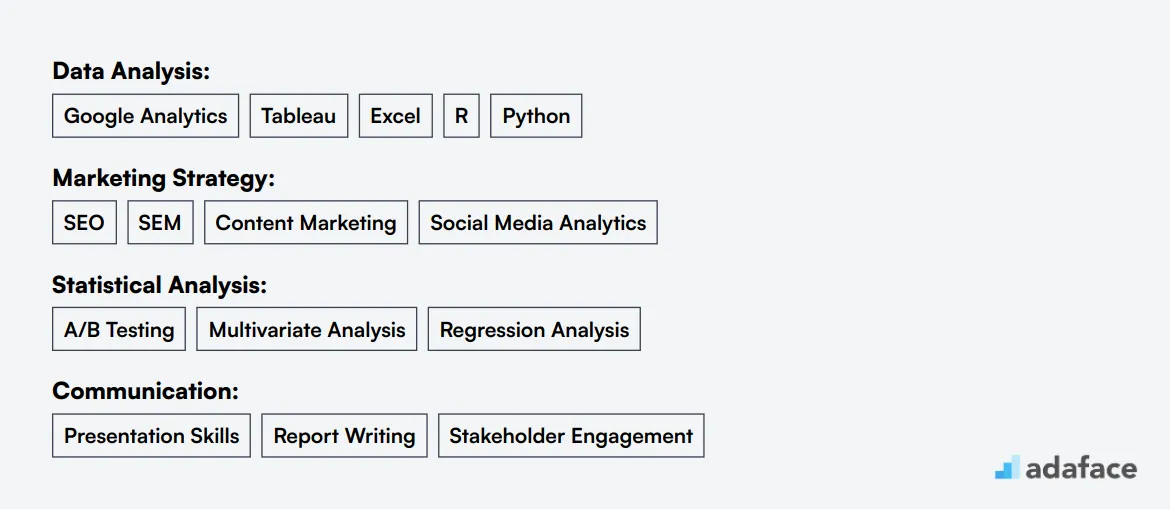
When manually screening resumes, focus on identifying key skills and qualifications. Look for a Bachelor's degree in Marketing or a related field, a couple of years of relevant experience, and proficiency in analytical tools like Google Analytics and Excel. The goal is to quickly sift through resumes and shortlist candidates who match these keywords and align with your needs.
An alternative approach is leveraging AI tools to streamline the screening process. By using advanced technologies such as Large Language Models (LLMs), you can efficiently match resumes against your job description. These tools can highlight relevant skills and provide a preliminary shortlist, saving time for recruiters and hiring managers.
Here's a sample AI prompt to help screen Marketing Analyst resumes:
TASK: Screen resumes to match job description for Marketing Analyst role
INPUT: Resumes
OUTPUT: For each resume, provide following information:
- Email id
- Name
- Matching keywords
- Score (out of 10 based on keywords matched)
- Recommendation (detailed recommendation of whether to shortlist this candidate or not)
- Shortlist (Yes, No or Maybe)
RULES:
- If you are unsure about a candidate's fit, put the candidate as Maybe instead of No
- Keep recommendation crisp and to the point.
KEYWORDS DATA:
- Analytical Tools (Google Analytics, Tableau, Excel)
- Skills (Communication, Presentation, Marketing KPIs)
- Experience (A/B Testing, SEO/SEM, CRM Software)
Utilizing prompts and LLMs can help automate a part of your resume screening, allowing you to focus on more detailed assessments later on.
Recommended skills tests for Marketing Analysts
Skills tests are an effective way to evaluate Marketing Analyst candidates beyond their resumes. They provide objective insights into a candidate's abilities and help you make informed hiring decisions. Here are five key tests we recommend for assessing Marketing Analysts:
Marketing Analysis Test: This test evaluates a candidate's ability to interpret data, identify trends, and draw actionable insights. It covers areas like market segmentation, customer behavior analysis, and marketing metrics.
Digital Marketing Test: As marketing increasingly moves online, digital skills are essential. This test assesses knowledge of various digital marketing channels, strategies, and best practices in areas like social media, content marketing, and SEO.
Google Analytics Test: Understanding web analytics is crucial for measuring campaign performance. This test evaluates a candidate's proficiency in using Google Analytics to track website traffic, user behavior, and conversion rates.
Growth Marketing Test: Growth marketing focuses on data-driven strategies to acquire and retain customers. This test assesses skills in areas like A/B testing, user acquisition, and conversion rate optimization.
Content Strategy Test: Content is at the heart of many marketing initiatives. This test evaluates a candidate's ability to develop effective content strategies, align content with business goals, and measure content performance.
Case Study Assignments to Evaluate Marketing Analysts
Case study assignments can be effective for assessing Marketing Analysts, but they come with drawbacks. They're often time-consuming, leading to lower completion rates and potentially losing qualified candidates. Despite these challenges, well-designed case studies can provide valuable insights into a candidate's skills and problem-solving abilities.
Market Segmentation Analysis: This case study asks candidates to analyze customer data and develop market segments for a fictional product. It tests their ability to interpret data, identify trends, and create actionable marketing strategies based on customer insights.
Campaign Performance Evaluation: Candidates are presented with data from a recent marketing campaign and asked to evaluate its effectiveness. This assignment assesses their skills in data analysis, metric interpretation, and ability to provide recommendations for future campaigns.
Competitive Analysis Project: This case study involves researching competitors in a specific market and developing a strategy to gain market share. It evaluates the candidate's research skills, strategic thinking, and ability to translate market insights into actionable marketing plans.
Structuring the Interview Stage for Marketing Analysts
After candidates pass the initial skills tests, it's time for technical interviews to assess their hard skills in depth. While skills tests are great for filtering out unqualified candidates, technical interviews are key to finding the best fit for your marketing analyst role. Let's look at some sample interview questions to help you evaluate candidates effectively.
Consider asking questions like: 'How would you approach analyzing our company's market position?', 'What metrics do you prioritize when evaluating a marketing campaign?', 'Can you explain how you've used data visualization tools in previous roles?', 'What's your process for conducting A/B tests?', and 'How do you stay updated on the latest marketing trends and technologies?'. These questions help assess the candidate's analytical skills, marketing knowledge, and ability to apply data-driven insights to business challenges.
What is the cost of hiring a Marketing Analyst?
The cost to hire a Marketing Analyst varies widely depending on experience and location. In the United States, the average salary is around $73,557, while in India, it's approximately ₹670,830. Consider also the local market demands and the specific skills required for your role, as these factors can significantly influence salary expectations.
Marketing Analyst Salary United States
In the United States, Marketing Analysts can expect to earn an average salary of $73,557. Salaries typically range from a minimum of $47,698 to a maximum of $103,527. Pay can vary significantly based on location, with cities like San Francisco and New York offering higher salaries compared to other regions.
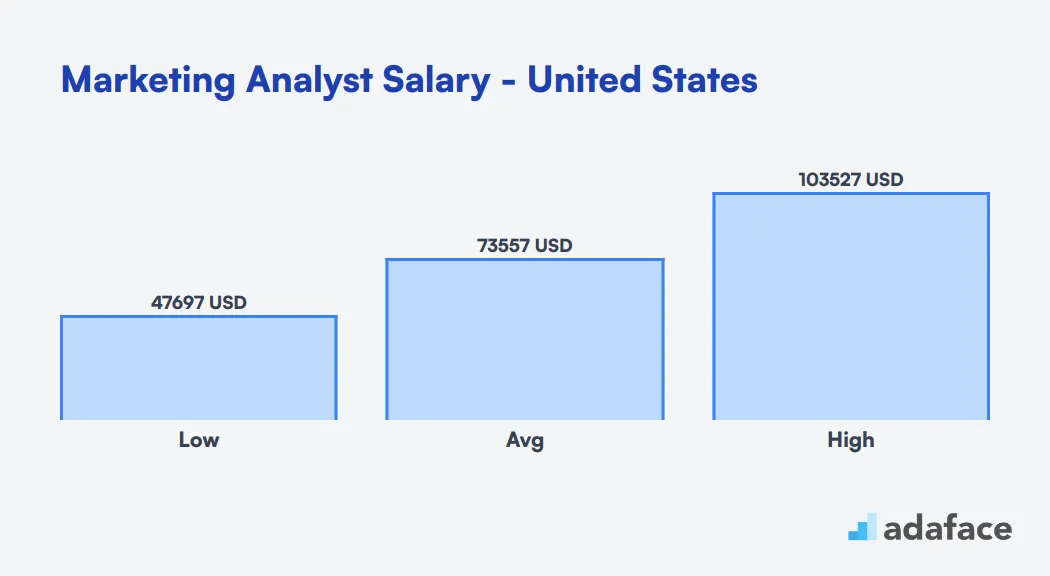
Marketing Analyst Salary in Canada
In Canada, Marketing Analysts earn an average annual salary of CAD 67,222. The salary range typically falls between CAD 50,417 and CAD 85,846, with the median being CAD 65,789.
Salaries can vary based on location. For instance, Calgary offers the highest average at CAD 70,200, while Vancouver has the lowest at CAD 53,770. Factors such as experience, company size, and industry can also influence compensation.
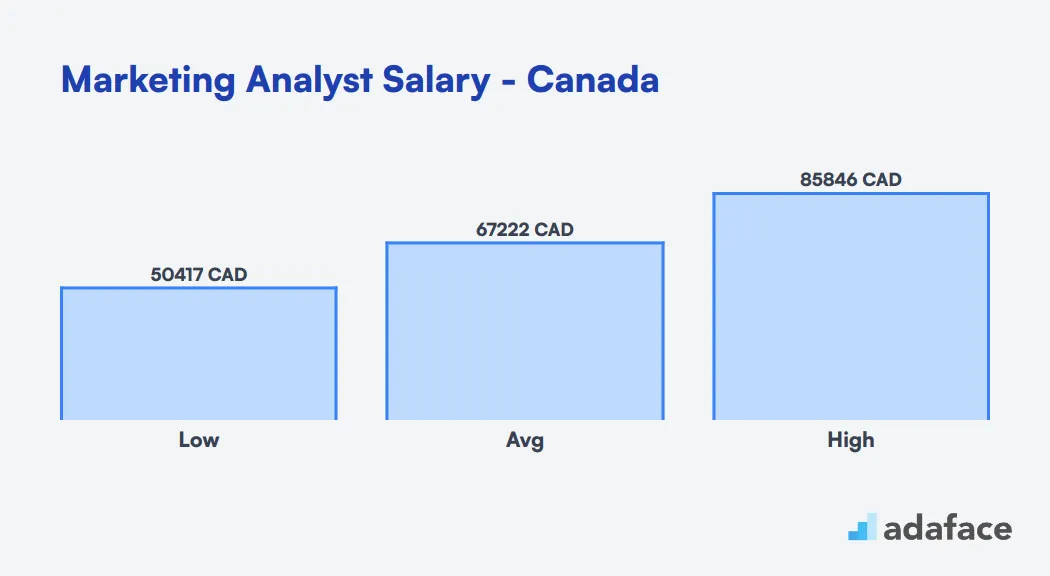
Marketing Analyst Salary in India
The average salary for a Marketing Analyst in India is approximately ₹670,830 per year. Salaries can range from ₹299,028 at the lower end to ₹1,144,138 for more experienced roles. Major cities like Mumbai and Gurgaon offer higher salaries, with averages of ₹1,123,615 and ₹853,333 respectively.
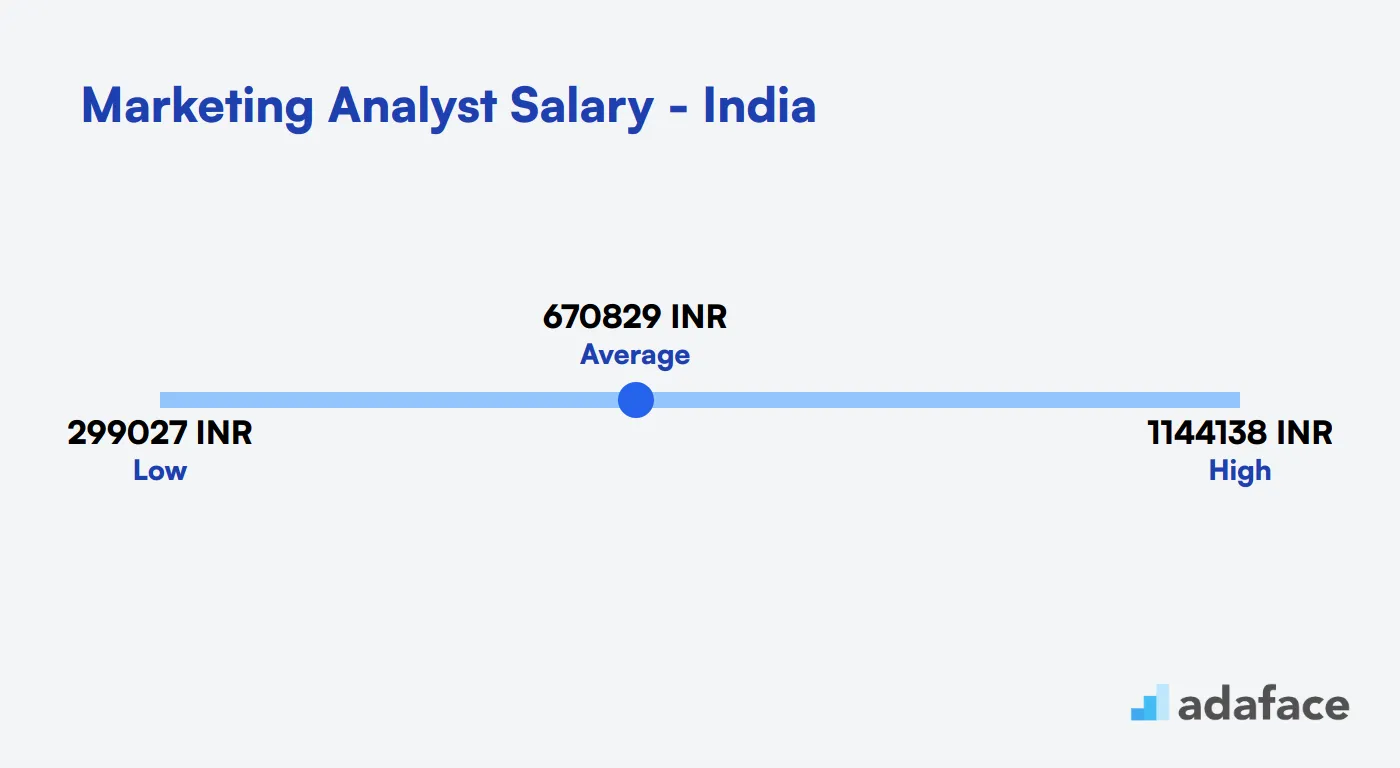
What's the difference between a Digital Marketing Analyst and a Market Research Analyst?
Digital Marketing Analysts and Market Research Analysts often get confused due to their data-driven roles in marketing. However, these positions have distinct focuses and skill sets that set them apart in the marketing landscape.
Digital Marketing Analysts concentrate on online marketing channels, using tools like Google Analytics and SEO software. They analyze web traffic and social media metrics to optimize online campaigns and increase visibility. Their key skills include SEO, SEM, and content strategy, typically producing traffic reports and engagement metrics.
On the other hand, Market Research Analysts focus on broader consumer and market trends. They use statistical tools like SPSS and conduct surveys and focus groups. Their expertise lies in statistical analysis and data interpretation, often resulting in consumer insights and market reports that guide product development.
While Digital Marketing Analysts usually have backgrounds in marketing or communications, Market Research Analysts often come from economics or psychology fields. Both roles are crucial for businesses, but they serve different purposes - Digital Marketing Analysts aim to boost online presence, while Market Research Analysts identify market opportunities and inform strategic decisions.
| Digital Marketing Analyst | Market Research Analyst | |
|---|---|---|
| Focus Area | Online Marketing Channels | Consumer and Market Trends |
| Primary Tools | Google Analytics, SEO Tools | SPSS, Survey Tools |
| Data Type | Web Traffic, Social Media Metrics | Surveys, Focus Groups |
| Key Skills | SEO, SEM, Content Strategy | Statistical Analysis, Data Interpretation |
| Typical Outputs | Traffic Reports, Engagement Metrics | Consumer Insights, Market Reports |
| Education Background | Marketing, Communications | Economics, Psychology |
| Business Role | Increase Online Visibility | Identify Market Opportunities |
| Decision Making | Optimize Online Campaigns | Guide Product Development |
What are the ranks of Marketing Analysts?
The hierarchy of marketing analysts can often be confusing due to overlapping roles and responsibilities. Understanding these ranks is crucial for recruiters and hiring managers to identify the right candidates for their teams.
• Junior Marketing Analyst: This is an entry-level position where individuals typically assist senior analysts. They handle data collection, basic analysis, and reporting tasks to support marketing initiatives.
• Marketing Analyst: At this level, analysts begin to take on more responsibility. They analyze marketing data, create reports, and provide insights that guide marketing strategies.
• Senior Marketing Analyst: Senior analysts have a deeper understanding of market trends and analytics tools. They lead projects, mentor junior team members, and provide strategic recommendations to improve marketing performance.
• Marketing Analytics Manager: This role involves overseeing the marketing analytics team and ensuring effective data analysis. Managers are responsible for developing analytical frameworks and driving data-driven decision-making across marketing efforts.
Hire the Best Marketing Analysts
Throughout this guide, we've covered the role of Marketing Analysts, their key skills, how to write effective job descriptions, and various screening methods. We've also explored platforms to find talent, discussed interview strategies, and looked at the costs involved in hiring.
If there's one key takeaway, it's the importance of using accurate job descriptions and skills tests to make your hiring process more precise. By combining these elements, you'll be well-equipped to identify and hire top Marketing Analyst talent that fits your organization's specific needs.
Marketing Analysis Test
FAQs
Hiring a Marketing Analyst is important because they provide data-driven insights that help shape marketing strategies, improve campaign effectiveness, and drive business growth.
A Marketing Analyst should have a strong background in data analysis, experience with statistical tools, and a solid understanding of marketing principles and consumer behavior.
You can find qualified Marketing Analysts on professional networking sites like LinkedIn, job boards, and recruitment platforms specialized in marketing roles.
A Marketing Analyst job description should include the role’s responsibilities, required qualifications, necessary skills, and any experience with specific tools or platforms.
Screen resumes by looking for relevant experience, specific skills in data analysis and marketing, and familiarity with necessary tools. Assessing portfolios or case studies can also be beneficial.
Ask both technical and behavioral questions that assess analytical skills, problem-solving abilities, and understanding of marketing processes. Refer to our Marketing Analyst Interview Questions for inspiration.
Skills tests help assess a candidate’s analytical abilities, problem-solving skills, and knowledge of marketing tools, ensuring they are capable of performing the role’s tasks effectively.

40 min skill tests.
No trick questions.
Accurate shortlisting.
We make it easy for you to find the best candidates in your pipeline with a 40 min skills test.
Try for freeRelated posts
Free resources



